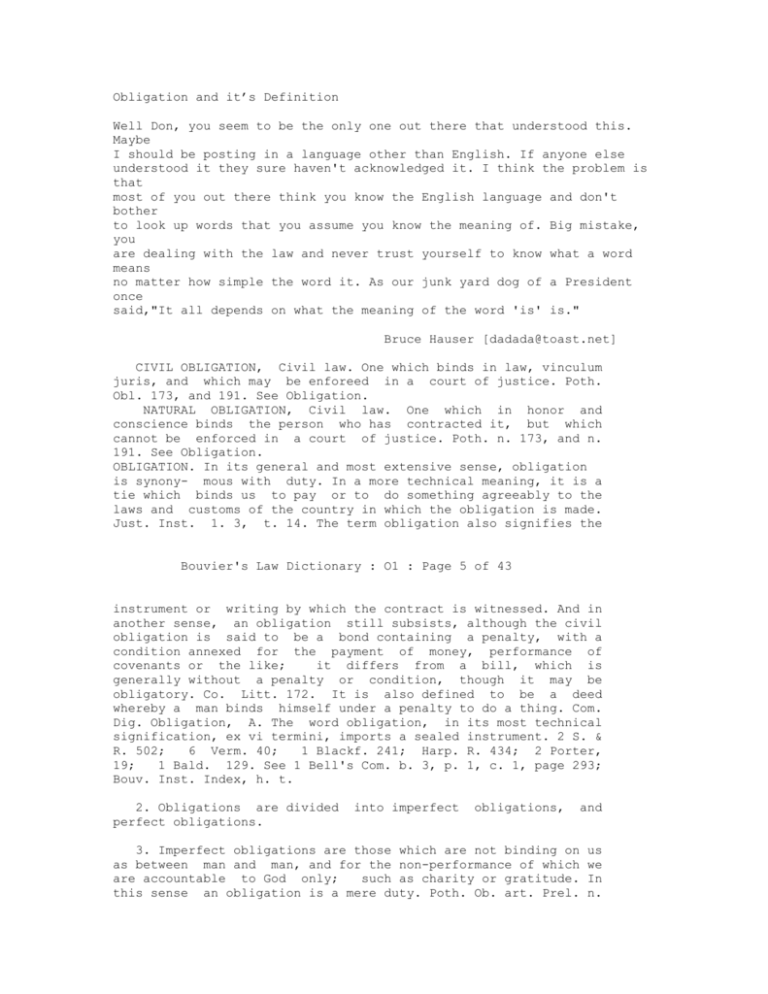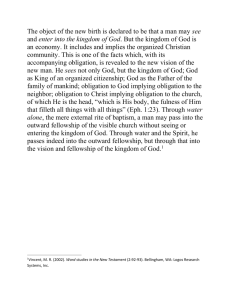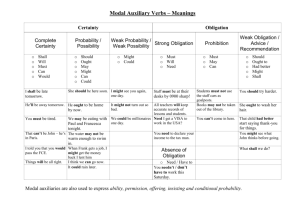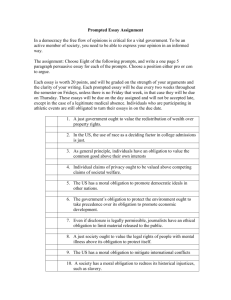Obligation and it's Definition
advertisement

Obligation and it’s Definition Well Don, you seem to be the only one out there that understood this. Maybe I should be posting in a language other than English. If anyone else understood it they sure haven't acknowledged it. I think the problem is that most of you out there think you know the English language and don't bother to look up words that you assume you know the meaning of. Big mistake, you are dealing with the law and never trust yourself to know what a word means no matter how simple the word it. As our junk yard dog of a President once said,"It all depends on what the meaning of the word 'is' is." Bruce Hauser [dadada@toast.net] CIVIL OBLIGATION, Civil law. One which binds in law, vinculum juris, and which may be enforeed in a court of justice. Poth. Obl. 173, and 191. See Obligation. NATURAL OBLIGATION, Civil law. One which in honor and conscience binds the person who has contracted it, but which cannot be enforced in a court of justice. Poth. n. 173, and n. 191. See Obligation. OBLIGATION. In its general and most extensive sense, obligation is synony- mous with duty. In a more technical meaning, it is a tie which binds us to pay or to do something agreeably to the laws and customs of the country in which the obligation is made. Just. Inst. 1. 3, t. 14. The term obligation also signifies the Bouvier's Law Dictionary : O1 : Page 5 of 43 instrument or writing by which the contract is witnessed. And in another sense, an obligation still subsists, although the civil obligation is said to be a bond containing a penalty, with a condition annexed for the payment of money, performance of covenants or the like; it differs from a bill, which is generally without a penalty or condition, though it may be obligatory. Co. Litt. 172. It is also defined to be a deed whereby a man binds himself under a penalty to do a thing. Com. Dig. Obligation, A. The word obligation, in its most technical signification, ex vi termini, imports a sealed instrument. 2 S. & R. 502; 6 Verm. 40; 1 Blackf. 241; Harp. R. 434; 2 Porter, 19; 1 Bald. 129. See 1 Bell's Com. b. 3, p. 1, c. 1, page 293; Bouv. Inst. Index, h. t. 2. Obligations are divided perfect obligations. into imperfect obligations, 3. Imperfect obligations are those which are not binding on as between man and man, and for the non-performance of which are accountable to God only; such as charity or gratitude. this sense an obligation is a mere duty. Poth. Ob. art. Prel. and us we In n. 1. 4. A perfect obligation is one which gives a right to another to require us to give him something or not to do something. These obligations are either natural or moral, or they are civil. 5. A natural or moral obligation is one which cannot be enforced by action, but which is binding on the party who makes it, in conscience and according to natural justice. As for instance, when the action is barred by the act of limitation, a natural obligation is extinguished. 5 Binn. 573. Although natural obligations cannot be enforeed by action, they have the following effect: 1. No suit will lie to recover back what has been paid, or given in compliance with a natural obligation. 1 T. R. 285; 1 Dall. 184, 2. A natural obligation is a sufficient consideration for a new contract. 5 Binn. 33; 2 Binn. 591; Yelv. 41, a, n. 1; Cowp. 290; 2 Bl. Com. 445; 3 B. & P. 249, n.; 2 East, 506; 3 Taunt. 311; 5 Taunt. 36; Yelv. 41, b. note; 3 Pick. 207 Chit. Contr. 10. 6. A civil obligation is one which has a binding operation in law, vinculum juris, and which gives to the obligee the right of enforcing it in a court of justice; in other words, it is an engagement binding on the obligor. 12 Wheat. It:. 318, 337; 4 Wheat. R. 197. 7. Civil obligations are divided into express and implied, pure. and conditional, primitive and secondary, principal and accessory, absolute and alternative, determinate and indeterminate, divisible and indivisible, single and penal, and joint and several. They are also purely personal, purely real, and both real and mixed at the same time. 8. Express or conventional obligations are those by which the obligor binds himself in express terms to perform his obligation. Bouvier's Law Dictionary : O1 : Page 6 of 43 9. An implied obligation is one which arises by operation of law; as, for example, if I send you daily a loaf of bread, without any express authority, and you make use of it in your family, the law raises an obligation on your part to pay me the value of the bread. 10. A pure or simple obligation is one which is not suspended by any condition, either because it has been contacted without condition, or, having been contracted with one, it has been fulfilled. 11. A conditional obligation is one the execution of which is suspended by a condition which has not been accomplished, and subject to which it has been contracted. 12. A called a primitive obligation, which in one sense may also be principal obligation, is one which is contracted with a design that it should, itself, be the first fulfilled. 13. A secondary obligation is one which is contrasted, and is to be performed, in case the primitive cannot be. For example, if I sell you my house, I bind myself to give a title, but I find I cannot, as the title is in another, then my secondary obligation is to pay you damages for my non-perform- ance of my obligation. 14. A principal obligation is one which is the most important object of the engagement of the contracting parties. 15. An accessory obligation is one which is dependent on the principal obligation; for example, if I sell you a house and lot of ground, the principal obligation on my part is to make you a title for it; the accessory obligation is to deliver you all the title papers which I have relating to it; to take care of the estate till it is delivered to you, and the like. 16. An absolute obligation is one which gives no alternative to the obligor, but he is bound to fulfil it according to his engagement. 17. An alternative obligation is, where a person or to give several things in such a manner that one will acquit him of all; as if A agrees to sufficient consideration, a horse, or one hundred Obl. Pt. 2, c. 3, art. 6, No.. 245. engages to do, the payment of give B, upon a dollars. Poth. 18. In order to constitute an alternative obligation, it is necessary that two or more things should be promised disjunctively; where they are promised conjunctively, there are as many obligations as the things which are enumerated, but where they are in the alternative, though they are all due, there is but one obligation, which may be discharged by the payment of any of them. 19. The choice of performing one of the obligations belongs to the obligor, unless it is expressly agreed that all belong to the creditor. Dougl. 14; 1 Lord Raym. 279; 4 N. S. 167. If one of the acts is prevented by the obligee, or the act of God, the Bouvier's Law Dictionary : O1 : Page 7 of 43 obligor is discharged from both. See 2 Evans' Poth. Ob. 52 to 54; Vin. Ab. Condition, S b; and articles Conjunctive; Disjunctive; Election. 20. A determinate obligation, is one which has for its object a certain thing; as an obligation to deliver a certain horse named Bucephalus. In this case the obligation can only be discharged by delivering the identical horse. 21. An indeterminate obligation is one where the obligor binds himself to deliver one of a certain species; as, to deliver a horse, the delivery of any horse will discharge the obligation. 22. A divisible obligation is one which being a unit may nevertheless be lawfully divided with or without the consent of the parties. It is clear it may be divided by consent, as those who made it, may modify or change it as they please. But some obligations may be divided without the consent of the obligor; as, where a tenant is bound to pay two hundred dollars a year rent to his landlord, the obligation is entire, yet, if his landlord dies and leaves two sons, each will be entitled to one hundred dollars; or if the landlord sells one undivided half of the estate yielding the rent, the purchaser will be entitled to receive one hundred dollars, and the seller the other hundred. See Apportionment. 23. An indivisible obligation is one which is not susceptible of division; as, for example, if I promise to pay you one hundred dollars, you cannot assign one half of this to another, so as to give him a right of action against me for his share. See Divisible. 24. A single obligation is one without any penalty; as, where I simply promise to pay you one hundred dollars. This is called a single bill, when it is under seal. 25. A penal obligation is one to which is attached a penal clause which is to be enforeed, if the principal obligation be not performed. In general equity will relieve against a penalty, on the fulfilment of the principal obligation. See Liquidated damages; Penalty. 26. A joint obligation is one by which several obligors promise to the obligee to perform the obligation. When the obligation is only joint and the obligors do not promise separately to fulfil their engagement they must be all sued, if living, to compel the performance; or, if any be dead, the survivors must all be sued. See Parties to actions. 27. A several obligation is one by which one individual, or if there be more, several individuals bind themselves separately to perform the engagement. In this case each obligor may be sued separately, and if one or more be dead, their respective executors may be sued. See Parties to actions. 28. The himself to obligation is, purely personal when the obligor binds do a thing; as if I give my note for one thousand Bouvier's Law Dictionary : O1 : Page 8 of 43 dollars, in that case my person only is bound, for my property is liable for the debt only while it belongs to me, and, if I lawfully transfer it to a third person, it is discharged. 29. The obligation is personal in another sense, as when the obligor binds himself to do a thing, and he provides his heirs and executors shall not be bound; as, for example, when he promises to pay a certain sum yearly during payment is to cease at his death. his life, and the 30. The obligation is real when real estate, and not the person, is liable to the obligee for the performance. A familiar example will explain this: when an estate owes an easement, as a right of way, it is the thing and not the owner who owes the easement. Another instance occurs when a person buys an estate which has been mortgaged, subject to the mortgage, he is not liable for the debt, though his estate is. In these cases the owner has an interest only because he is seised of the servient estate, or the mortgaged premises, and he may discharge himself by abandoning or parting with the property. 31. The obligation is both personal and real when the obligor has bound himself, and pledged his estate for the fulfilment of his obligation. OBLIGATION OF CONTRACTS. By this expression, which is used in the consti- tution of the United States, is meant a legal and not merely a moral duty. 4 Wheat. 107. The obligation of contracts consists in the necessity under which a man finds himself to, do, or to refrain from doing something. This obligation consists generally both in foro legis and in foro conscientice, though it does at times exist in one of these only. It is certainly of the first, that in foro legis, which the framers of the constitution spoke, when they prohibited the passage of any law impairing the obligation of contract. 1 Harr. Lond. Rep. Lo. 161. See Impairing the obligation of contracts. OBLIGEE or CREDITOR, contracts. The person in favor of whom some obliga- tion is contracted, whether such obligation be to pay money, or to do, or not to do something. Louis. Code, art. 3522, No. 11. 2. Obligees are either several or joint, an obligee is several when the obligation is made to him alone; obligees are joint when the obligation is made to two or more, and, in that event, each is not a creditor for his separate share, unless the nature of the subject or the particularity of the expression in the instrument lead to a different conclusion. 2 Evans' Poth. 56; Dyer 350 a, pl. 20; Hob. 172; 2 Brownl. 207 Yelv, 177; Cro. Jac. 251. OBLIGOR or DEBTOR. The person who has engaged to perform some obligation. Louis. Code, art. 3522, No. 12. The word obligor, in its more technical signification, is applied to designate one who makes a bond. 2. Obligors are joint and several. They are joint when they Bouvier's Law Dictionary : O1 : Page 9 of 43 agree to pay the obligation jointly, and then the survivors only are liable upon it at law, but in equity the assets of a deceased joint obligor may be reached. 1. Bro. C. R. 29; 2 Ves. 101; Id. 371. They are several when one or more bind themselves each of them separately to perform the obligation. In order to become an obligor, the party must actually, either himself or by his attorney, enter into the obligation, and execute it as his own. If a man sign and seal a bond as his own, and deliver it, he will be bound by it, although his name be not mentioned in the bond. 4 Stew. R. 479; 4 Hayw R. 239; 4 McCord, R. 203; 7 Cowen; R. 484; 2 Bail. R. 190; Brayt. 38; 2 H. & M. 398; 5 Mass. R. 538; 2 Dana, R. 463; 4 Munf. R. 380; 4 Dev. 272. When the obligor signs between the penal part and the condition, still the latter will be a part of the instrument. 2 Wend. Rep. 345; 3 H. & M. 144. 3. The execution of a bond by the obligor with a blank, and a verbal authority to fill it up, and it is afterwards filled up, does not bind the obligor, unless it is redelivered, or acknowledged or adopted. 1 Yerg. R. 69 149; 1 Hill, Rep. 267; 2 N. & M. 125; 2 Brock. R. 64; 1 Ham. R. 368; 2 Dev. R. 369 6 Gill. & John. 250; but see contra, 17 Serg. & R. 438; and see 6 Serg. & Rawle, 308; Wright, R. 742. -----Original Message----From: don wishart <dew10@hotmail.com> To: dadada@toast.net <dadada@toast.net> Date: Wednesday, January 10, 2001 4:05 AM Subject: Re: Federal income taxes shall be considered as a gift or bequest to or for the use of the United States >Bruce, That's pretty fantastic. I just ask that you might give me credit >for this but...in view of what you posted, now go and read "Obligation" in >Blacks 5/6th at Perfect and Imperfect Obligation and see what it says about >Positive Law, gifts, etc. I think we tied it all together!!! Hot Dang. >Don Wishart > > >From: "Bruce Hauser" <dadada@toast.net> >To: "John P. Ellis" <jellissr@juno.com> >Subject: Federal income taxes shall be considered as a gift or bequest to or >for the use of the United States >Date: Tue, 9 Jan 2001 16:08:18 -0500 > >March 3, 1821 [ Cohens v. Com. of Virginia > 19 U.S. 264 (1821) ; > "but if a law, though passed by Congress, be passed in execution of a >municipal power, as a law to pave the streets of Washington, then it cannot, >in any propriety of language, [295] be called a law of the United States." >a.. United States Code >TITLE 31 - MONEY AND FINANCE >SUBTITLE I - GENERAL >CHAPTER 3 - DEPARTMENT OF THE TREASURY > a.. SUBCHAPTER II - ADMINISTRATIVE > b.. > c.. Sec. 321. General authority of the Secretary (IN PART) > >b.. (1) The Secretary of the Treasury may accept, hold, administer, and use >gifts and bequests of property, both real and personal, for the purpose of >aiding or facilitating the work of the Department of the Treasury. Gifts and >bequests of money and the proceeds from sales of other property received as >gifts or bequests shall be deposited in the Treasury in a separate fund and >shall be disbursed on order of the Secretary of the Treasury. Property >accepted under this paragraph, and the proceeds thereof, shall be used as >nearly as possible in accordance with the terms of the gift or bequest. >c.. (2) For purposes of the Federal income, estate, and gift taxes, property >accepted under paragraph (1) shall be considered as a gift or bequest to or >for the use of the United States. >US Code as of: 01/05/99 > >TITLE 31 - MONEY AND FINANCE >Sec. 321. General authority of the Secretary > > a.. (a) The Secretary of the Treasury shall > a.. (1) prepare plans for improving and managing receipts of the > United States Government and managing the public debt; > a.. (2) carry out services related to finances that the Secretary > is required to perform; > a.. (3) issue warrants for money drawn on the Treasury consistent > with appropriations; > a.. (4) mint coins, engrave and print currency and security > documents, and refine and assay bullion, and may strike medals; > a.. (5) prescribe regulations that the Secretary considers best > calculated to promote the public convenience and security, and to > protect the Government and individuals from fraud and loss, that > apply to anyone who may > a.. (A) receive for the Government, Treasury notes, United States > notes, or other Government securities; or > a.. (B) be engaged or employed in preparing and issuing those > notes or securities; > a.. (6) collect receipts; > a.. (7) with a view to prosecuting persons, take steps to discover > fraud and attempted fraud involving receipts and decide on ways > to prevent and detect fraud; and > (8) maintain separate accounts of taxes received in each State, > territory, and possession of the United States, and collection > district, with each account listing > a.. (A) each kind of tax; > a.. (B) the amount of each tax; and > (C) the money paid as pay and allowances to officers and > employees of the Department collecting taxes in that State, > territory, possession, or district. > a.. (b) The Secretary may > a.. (1) prescribe regulations to carry out the duties and powers of > the Secretary; > a.. (2) delegate duties and powers of the Secretary to another > officer or employee of the Department of the Treasury; > a.. (3) transfer within the Department the records, property, > officers, employees, and unexpended balances of appropriations, > allocations, and amounts of the Department that the Secretary > considers necessary to carry out a delegation made under clause > a.. (2) of this subsection; > a.. (4) detail, in addition to details authorized under another > law, not more than 6 officers and employees of the Department at > any one time to enforce the laws related to the Department, > except that of those 6 officers and employees not more than 4 > officers and employees > a.. (A) paid from the appropriations for the collection of > customs may be so detailed; > a.. (B) paid from the appropriations for internal revenue may be > so detailed; and > (C) paid from the appropriations for suppressing > counterfeiting and other crimes may be so detailed; > a.. (5) authorize, at rates and under conditions prescribed by the > Secretary, the private use of telephone lines controlled by the > Department when the use does not interfere with Department > business; > a.. (6) buy arms and ammunition required by officers and employees > of the Department in carrying out their duties and powers; and > (7) notwithstanding any other provision of law, fulfill any > requirement to issue a report on the financial condition of any > fund on the books of the Treasury by including the required > information in a consolidated report, except that information > with respect to a specific fund shall be separately reported if > the Secretary determines that the consolidation of such > information would result in an unwarranted delay in the > availability of such information. > a.. (c) Duties and powers of officers and employees of the Department are >vested in the Secretary except duties and powers > a.. (1) vested by subchapter II of chapter 5 of title 5 in > administrative law judges employed by the Secretary; > a.. (2) of the Comptroller of the Currency; and > (3) of the Director of the Office of Thrift Supervision; > a.. (d) > a.. (1) The Secretary of the Treasury may accept, hold, administer, and >use gifts and bequests of property, both real and personal, for the purpose >of aiding or facilitating the work of the Department of the Treasury. Gifts >and bequests of money and the proceeds from sales of other property received >as gifts or bequests shall be deposited in the Treasury in a separate fund >and shall be disbursed on order of the Secretary of the Treasury. Property >accepted under this paragraph, and the proceeds thereof, shall be used as >nearly as possible in accordance with the terms of the gift or bequest. > a.. (2) For purposes of the Federal income, estate, and gift taxes, >property accepted under paragraph (1) shall be considered as a gift or >bequest to or for the use of the United States. > a.. (3) The Secretary of the Treasury may invest and reinvest the fund >in public debt securities with maturities suitable for the needs of the fund >and bearing interest at rates determined by the Secretary of the Treasury, >taking into consideration the current average market yield on outstanding >marketable obligations of the United States of comparable maturities. Income >accruing from the securities, and from any other property accepted under >paragraph (1), shall be deposited to the credit of the fund, and shall be >disbursed on order of the Secretary of the Treasury for purposes as nearly >as possible in accordance with the terms of the gifts or bequests. > a.. (4) The Secretary of the Treasury shall, not less frequently than >annually, make a public disclosure of the amount (and sources) of the gifts >and bequests received under this subsection, and the purposes for which >amounts in the separate fund established under this subsection are expended. > a.. (e) Certain Reorganization Prohibited. - The Secretary of the >Treasury may not merge or consolidate the Office of Thrift Supervision, or >any of the functions or responsibilities of the Office or the Director of >such office, with the Office of the Comptroller of the Currency or the >Comptroller of the Currency. > > >_________________________________________________________________ >Get your FREE download of MSN Explorer at http://explorer.msn.com >






